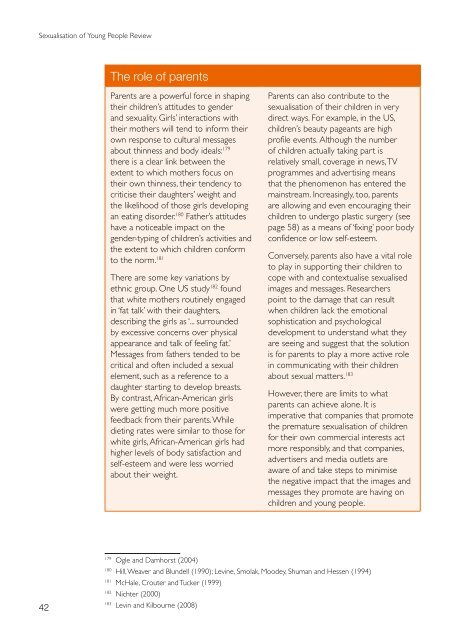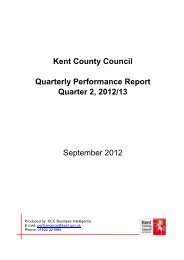Sexualisation of Young People Review
Sexualisation of Young People Review
Sexualisation of Young People Review
Create successful ePaper yourself
Turn your PDF publications into a flip-book with our unique Google optimized e-Paper software.
<strong>Sexualisation</strong> <strong>of</strong> <strong>Young</strong> <strong>People</strong> <strong>Review</strong><br />
The role <strong>of</strong> parents<br />
Parents are a powerful force in shaping<br />
their children’s attitudes to gender<br />
and sexuality. Girls’ interactions with<br />
their mothers will tend to inform their<br />
own response to cultural messages<br />
about thinness and body ideals: 179<br />
there is a clear link between the<br />
extent to which mothers focus on<br />
their own thinness, their tendency to<br />
criticise their daughters’ weight and<br />
the likelihood <strong>of</strong> those girls developing<br />
an eating disorder. 180 Father’s attitudes<br />
have a noticeable impact on the<br />
gender-typing <strong>of</strong> children’s activities and<br />
the extent to which children conform<br />
to the norm. 181<br />
There are some key variations by<br />
ethnic group. One US study 182 found<br />
that white mothers routinely engaged<br />
in ‘fat talk’ with their daughters,<br />
describing the girls as ‘... surrounded<br />
by excessive concerns over physical<br />
appearance and talk <strong>of</strong> feeling fat.’<br />
Messages from fathers tended to be<br />
critical and <strong>of</strong>ten included a sexual<br />
element, such as a reference to a<br />
daughter starting to develop breasts.<br />
By contrast, African-American girls<br />
were getting much more positive<br />
feedback from their parents. While<br />
dieting rates were similar to those for<br />
white girls, African-American girls had<br />
higher levels <strong>of</strong> body satisfaction and<br />
self-esteem and were less worried<br />
about their weight.<br />
Parents can also contribute to the<br />
sexualisation <strong>of</strong> their children in very<br />
direct ways. For example, in the US,<br />
children’s beauty pageants are high<br />
pr<strong>of</strong>ile events. Although the number<br />
<strong>of</strong> children actually taking part is<br />
relatively small, coverage in news, TV<br />
programmes and advertising means<br />
that the phenomenon has entered the<br />
mainstream. Increasingly, too, parents<br />
are allowing and even encouraging their<br />
children to undergo plastic surgery (see<br />
page 58) as a means <strong>of</strong> ‘fixing’ poor body<br />
confidence or low self-esteem.<br />
Conversely, parents also have a vital role<br />
to play in supporting their children to<br />
cope with and contextualise sexualised<br />
images and messages. Researchers<br />
point to the damage that can result<br />
when children lack the emotional<br />
sophistication and psychological<br />
development to understand what they<br />
are seeing and suggest that the solution<br />
is for parents to play a more active role<br />
in communicating with their children<br />
about sexual matters. 183<br />
However, there are limits to what<br />
parents can achieve alone. It is<br />
imperative that companies that promote<br />
the premature sexualisation <strong>of</strong> children<br />
for their own commercial interests act<br />
more responsibly, and that companies,<br />
advertisers and media outlets are<br />
aware <strong>of</strong> and take steps to minimise<br />
the negative impact that the images and<br />
messages they promote are having on<br />
children and young people.<br />
179180181182183<br />
179<br />
Ogle and Damhorst (2004)<br />
180<br />
Hill, Weaver and Blundell (1990); Levine, Smolak, Moodey, Shuman and Hessen (1994)<br />
181<br />
McHale, Crouter and Tucker (1999)<br />
182<br />
Nichter (2000)<br />
42<br />
183<br />
Levin and Kilbourne (2008)

















